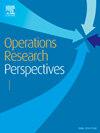Smart allocation of a developer's spending on product quality and non-salary employee benefits in a supply chain of apps
IF 3.7
4区 管理学
Q2 OPERATIONS RESEARCH & MANAGEMENT SCIENCE
引用次数: 0
Abstract
Qualified and capable employees are crucial for the success of high-tech companies. With an ever-shrinking pool of talent, employers are forced to devise creative recruitment and retention methods, which increasingly take the form of heavy spending on non-salary benefits. The present study contributes to the existing supply-chain literature through examining the role played by such benefits in a two-agent system consisting of a platform and an app developer. In particular, we examine the effect of non-salary benefits on the outgoing quality created by the employees of the app developer. The parties follow a Stackelberg sequential game led by the platform to accurately reflect the interaction in the market, allowing us to reach equilibrium using backward induction. Our results indicate that when app developers are more risk averse or face greater uncertainty, they spend a greater amount on non-salary benefits and comparatively less on app quality. This finding highlights the importance of investing in workers, particularly in uncertain times. We further extend the applicability and robustness of our findings by introducing multiple developers to our two-agent system. The extension proves that the platform charges a universal commission rate, irrespective of the number of developers – a finding that is consistent with current practice. Given the non-linear effect of key model parameters on the profits of the supply-chain members in both the single and the multiple-developer setups, we also utilize numerical analyses and arrive at telling managerial implications for all parties.
在应用程序供应链中,明智地分配开发者在产品质量和非工资员工福利上的支出
合格和有能力的员工对高科技公司的成功至关重要。随着人才库的不断萎缩,雇主们被迫设计出创造性的招聘和留住方法,这些方法越来越多地以在非工资福利上的巨额支出为形式。本研究通过考察这些利益在由平台和应用程序开发商组成的双代理系统中所起的作用,为现有的供应链文献做出了贡献。特别是,我们研究了非工资福利对应用程序开发人员的员工创造的离职质量的影响。各方遵循由平台主导的Stackelberg序贯博弈,准确反映市场中的相互作用,使我们能够利用逆向归纳达到均衡。我们的研究结果表明,当应用开发者更厌恶风险或面临更大的不确定性时,他们会在非工资福利上投入更多,而在应用质量上投入较少。这一发现凸显了投资于员工的重要性,尤其是在不确定时期。通过将多个开发人员引入我们的双代理系统,我们进一步扩展了我们发现的适用性和健壮性。扩展证明,该平台收取普遍的佣金率,无论开发人员的数量-这一发现与目前的做法是一致的。考虑到关键模型参数在单一和多个开发商设置下对供应链成员利润的非线性影响,我们还利用数值分析并得出对各方的管理影响。
本文章由计算机程序翻译,如有差异,请以英文原文为准。
求助全文
约1分钟内获得全文
求助全文
来源期刊

Operations Research Perspectives
Mathematics-Statistics and Probability
CiteScore
6.40
自引率
0.00%
发文量
36
审稿时长
27 days
 求助内容:
求助内容: 应助结果提醒方式:
应助结果提醒方式:


